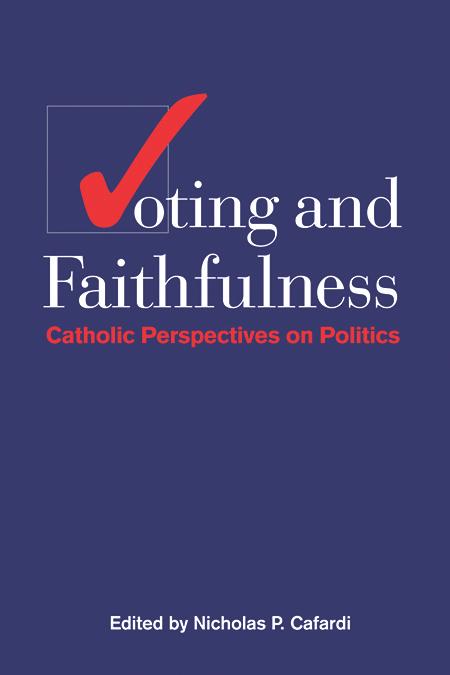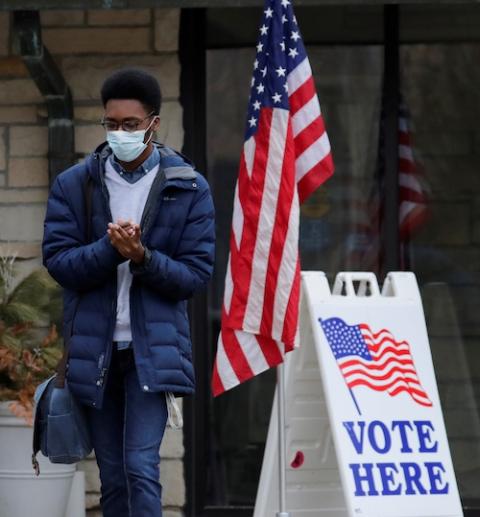"I Voted" stickers Nov. 6, 2018, in Baton Rouge, Louisiana (CNS/The Catholic Commentator/Richard Meek)
Voting and Faithfulness: Catholic Perspectives on Politics, edited by former Duquesne University Law professor Nicholas Cafardi, shows us what the U.S. bishops' quadrennial document "Forming Consciences for Faithful Citizenship" could be if it had been done with a view towards reflecting Catholic teaching, rather than forged as part of an effort to align the Catholic Church with the Republican Party.
It is always a challenge to review a book that consists of chapters from different authors. Anthologies are almost always uneven in quality, both of thought and of writing, and this one is no different. It is also a sign that one is getting old when so many of the arguments are familiar and when you know so many of the authors personally, at least through correspondence, from having plowed the same fields through the years. Still, a reviewer must commit to showing neither fear nor favor, and none shall be shown.
Cafardi's own contribution is important, not only for its essential argument, that "Faithful Citizenship" needs to be reformed, but also for demonstrating the lengths the bishops were willing to go to distort Catholic teaching to align the document with the Republican Party. Specifically, the introduction of the category "intrinsic evil" has no place in a document on voting because it is the wrong category, especially when it is crassly contrasted with those issues that require prudential judgment.

Cover art for "Voting and Faithfulness" (Paulist Press)
"The application of moral principles to politics always has and always will require prudential judgment where rational people may disagree and those who disagree with us are not, for that reason, evil, or even bad Catholics or anti-Catholics," Cafardi writes.
As a Catholic, there is no cognizable moral principle that justifies removing legal protection from any life, especially those lives that are most vulnerable, but how we as a country go about defending individual human lives requires a great deal of prudential judgment: You must consider how the law can reasonably be applied and whether or not it will be effective, what will be the political backlash of a particular form of advocacy, which types of legislation have the best chance at passing, and which are likely to survive a constitutional challenge.
The reverse is also true: Prudential judgment is not a "get-out-of-jail-free" card to permit dissent from the moral teachings of the church. Prudence is a virtue and it works all the way down to a concrete decision that can be, and must be, evaluated morally.
Another standout chapter is that by Boston College's M. Cathleen Kaveny, which also criticizes "Faithful Citizenship" and does so by examining the moral act of voting. Regular readers will be familiar with some of the issues raised here because it is an adaptation of arguments found in her book Law's Virtues: Fostering Autonomy and Solidarity in American Society. The most salient point here is that only if a voter is participating in a referendum is that person making a direct decision about an issue and its resolution. Usually, a voter is voting for a candidate and so a host of other considerations such as the candidate's character and competence come into the equation. No one is better than Kaveny at exploring the relationship of ideas to each other and to a range of concrete experiences to explain the ways we discern, and only then approach, the issue of what we should decide.
David DeCosse of Santa Clara University has a fine chapter on the relationship of conscience with other theological concepts such as the common good and the sensus fidelium, the "supernatural sense of faith of the entire people of God." At a time when too many theologians have decided to be activists, it is nice to see DeCosse doing theology, drawing distinctions, making arguments, linking important viewpoints to create new insights. I found myself agreeing with most of his conclusions.
Advertisement
My only concern is that, in a book like this, aimed at the general reader, DeCosse needed to be a bit more stiff-necked. Many of our fellow Catholics employ the word "conscience" when what they actually engage in is self-will, which is the opposite of conscience. Similarly, I am sure DeCosse has heard someone invoke the sensus fidelium and then cite a poll, forgetting that a poll can seek the opinions of those who are not full of faith as well as those who are.
The essay "Worker Justice as a Pro-Life Issue" by Villanova's Gerald Beyer makes many points with which I agree and which should inform conscientious Catholic voters. It is shocking that more people do not recognize the degree to which the decline of organized labor has exacerbated every other negative socioeconomic trend in the country. But I am at odds with the premise of the essay also: An issue does not have to be squeezed into the "pro-life" category in order for it to be seen as important.

A student at Lawrence University in Appleton, Wisconsin, sanitizes his hands after voting in the presidential primary election April 7. (CNS/Dan Powers/Appleton Post-Crescent, USA TODAY NETWORK via Reuters)
Other essays are more problematic. University of Portland theologian Christina Astorga writes about populism, but her essay reads like a tract from the Democratic National Committee. As well, painting Jesus as the "true populist" strained my intellectual sympathies. Fairfield University's Nancy Dallavalle's chapter "Our 'First Freedom'? Sex, Gender, and Sexuality in Religious Freedom Claims" is poorly done. She writes, for example: "Theologically, we do not understand Catholic teaching on human sexuality to be in the category of 'revealed' truth, as would be, for example, the teaching that God is triune, or that Jesus Christ rose from the dead." It is true that human sexuality involves more mundane consideration than the doctrine of the Trinity, but it is simply wrong to say it is not rooted in revealed truth. In turn, we put our experiences and our secular knowledge into fruitful dialogue with that revealed truth. Christian anthropology, after all, is rooted in the belief that we are made in the image of a Triune God, is it not?
Overall, however, this volume is a helpful contribution to discussions Catholics should be having about what it means to form our consciences and what it means to be a faithful citizen. The addition of questions for further reflection at the end of each chapter makes the book useful for parish discussion groups. More importantly, it provides the nation's bishops with some sound analysis they should bear in mind as they begin to think about drafting a new version of their quadrennial document on the moral responsibilities of Catholic citizens.
[Michael Sean Winters covers the nexus of religion and politics for NCR.]
Editor's note: Don't miss out on Michael Sean Winters' latest. Sign up and we'll let you know when he publishes new Distinctly Catholic columns.







